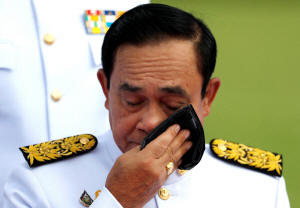Explainer-How a Thai court suspended Prime Minister Prayuth
 Send a link to a friend
Send a link to a friend
 [August 24, 2022]
BANGKOK (Reuters) - A
decision by Thailand's Constitutional Court to suspend Prime Minister
Prayuth Chan-ocha from official duties on Wednesday was a blow to the
former army chief who first came to power when he toppled an elected
government in a 2014 coup. [August 24, 2022]
BANGKOK (Reuters) - A
decision by Thailand's Constitutional Court to suspend Prime Minister
Prayuth Chan-ocha from official duties on Wednesday was a blow to the
former army chief who first came to power when he toppled an elected
government in a 2014 coup.
The decision was a rare, though possibly brief, victory for opposition
parties that have sought to loosen Prayuth's hold on power through
elections, parliamentary manoeuvres and legal cases.
WHAT LED TO THE SUSPENSION?
The court suspended Prayuth while it considers a petition that he has
reached an eight-year term limit set for prime ministers in the 2017
constitution written by a military appointed committee after the coup
and passed in a referendum.
The petition - by opposition parties that have failed to oust Prayuth in
four no-confidence votes - says that because the army junta Prayuth led
named him prime minister in August 2014, a few months after the coup, he
reached the limit this week.
Wednesday's decision by the court was to accept and investigate that
petition.
Some Prayuth supporters argue his premiership in fact started in 2017,
when the new constitution came into force.

Others date Prayuth's term to 2019, when his pro-army party contested
and won elections. Later that year, parliament elected him as civilian
prime minister in a process opposition politicians have said was skewed
to favour pro-army candidates. Prayuth's government says the elections
were free and fair.
WHO IS IN CHARGE NOW?
Deputy Prime Minister Prawit Wongsuwan, 77, will be the interim leader
after the court suspended Prayuth, government spokesman Anucha
Burapachaisri told reporters.
Prawit, himself a former army chief, is a longtime royalist figure and
considered a political kingmaker in the conservative movement.
[to top of second column]
|

Thailand's Prime Minister Prayuth Chan-ocha
wipes his face during a family photo session with new cabinet
ministers at the Government House in Bangkok, Thailand August 13,
2020. REUTERS/Jorge Silva/File Photo

If the court were to later rule Prayuth had reached his term limit,
the elected parliament would then pick a new prime minister from
among qualified candidates who ran in the 2019 election.
Prayuth's Palang Pracharat party heads a 17-party coalition in
parliament that should, combined with the votes of a
military-selected Senate, give it enough votes to decide the next
prime minister.
WHAT HAPPENS NEXT?
The court has given Prayuth 15 days to respond to his suspension.
But it did not set a timeline to issue a ruling on the petition
itself.
COULD PRAYUTH BE RESTORED?
Yes. If the court rules that Prayuth's term officially began in 2017
or 2019, he could be re-instated.
That would mean he could stay in power until 2025 or 2027, depending
on the results of the next elections.
COULD THERE BE ELECTIONS SOON?
The next elections are due by May next year under the constitution,
but a sitting prime minister has the power to call early elections
by dissolving the elected House of Representatives.
In that case, an election would be held within 60 days after a house
dissolution.
However, ruling party members have said elections are unlikely until
after Thailand hosts the Asia-Pacific Economic Cooperation leaders'
summit in November in Bangkok.
(Reporting by Panu Wongcha-um and Panarat Thepgumpanat; Writing by
Kay Johnson; Editing by Clarence Fernandez)
[© 2022 Thomson Reuters. All rights
reserved.]
This material may not be published,
broadcast, rewritten or redistributed.
Thompson Reuters is solely responsible for this content. |